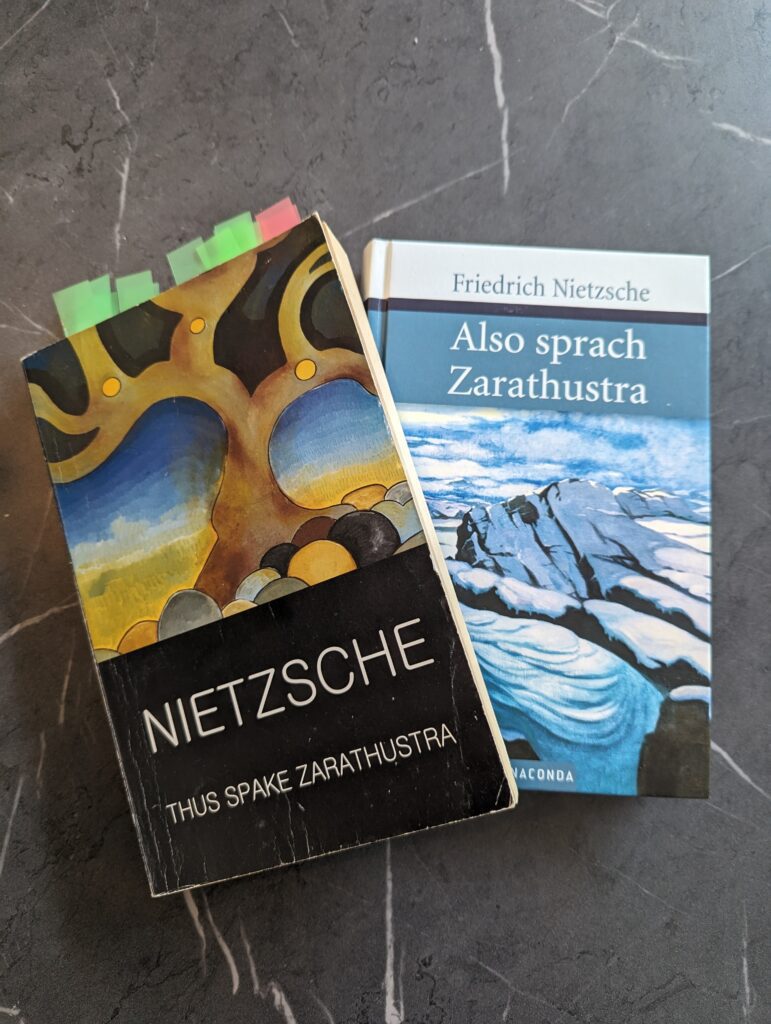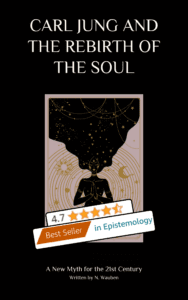Table of Contents
Introduction
Thus Spoke Zarathustra is Friedrich Nietzsche’s most famous book, and this is not without reason. Thus Spoke Zarathustra is a unique and strange book within Western philosophy, it is, however, filled with unique ideas and insights, many of which are still relevant today. Among Nietzsche’s books, Thus Spoke Zarathustra is unique as well because it is Nietzsche’s only book with a story line. Instead of Simply listing and discussing his ideas, Nietzsche used the character Zarathustra and the interactions Zarathustra had with other characters to discuss his ideas. Thus Spoke Zarathustra overflows with Nietzsche’s most famous ideas, such as: the eternal recurrence, the overman, the last man, the three metamorphoses of the spirit, and many more. Throughout this summary, explanation, and analysis of Nietzsche’s Thus Spoke Zarathustra, Nietzsche’s most prominent ideas from this book are addressed.

The Overman
Zarathustra, a character inspired by the Iranian profit Zoroaster, leaves his cave on a mountain after living there in solitude for ten years. Zarathustra is excited to share the wisdom he acquired while living in solitude for such a long time with the villagers living at the foot of the mountain.
Most notably, Zarathustra is excited to tell humanity about the coming of the overman (Übermensch). According to Nietzsche, the overman is the next stage in evolution for humanity; mankind merely being a phase between the animal, where man’s development began, and the overman, where this development will have been completed.
So why is the overman so much better than a regular human according to Nietzsche? Nietzsche argued that the overman is the highest form achievable for mankind because the overman is someone who is capable of creating his own values. The overman does not need some kind of institution to tell him what is right or wrong, instead, he can separate himself from the herd and think for himself. Throughout some of his other books, Nietzsche stressed the importance of creating one’s own values, thereby extending one’s morality beyond good and evil.
Zarathustra, however, quickly loses his excitement since the villagers he interacts with are not at all interested in his prophecy of the overman.
The Last Man
Hereupon Zarathustra shares his anxiety that, if man is not willing to move into the direction of the overman, another kind of man may emerge; the last man: “Man is a rope stretched between the animal and the superman – a rope over an abyss.” (p.8)
The last man, as opposed to the overman, cannot think for himself and is dependent upon the herd and institutions such as the church and state to determine his values; the last man cannot figure out for himself what is right and wrong.
The abyss of the last man is extremely dangerous according to Nietzsche because the last man will falsely believe that he has found happiness. This false kind of happiness is characterized by a situation where life has become too easy, according to Nietzsche.
As Nietzsche argued, the last man does not want to be anything but mediocre; he does not want to be rich, poor, powerful, or weak, for all of these things are too burdensome for the last man. Among the last man, everyone would be equal and there is no place for differing and creative ideas, for these would be considered dangerous to the happy lives of the last man.
These happy lives, however, are characterized by unoriginality;“No shepherd, and one herd!” (p.11). Moreover, for their pleasure, they are dependent on a little poison (pills and medication), and hard work is considered foolish. There is no longer any chaos among man, which Nietzsche considered to be problematic since he considered some chaos to be essential for the flourishing of humanity: I tell you: one must still have chaos in one, to give birth to a dancing star. I tell you: ye have still chaos in you. (p. 10)
All the while, however, the last man will not be able to be convinced of this; he is happy with this situation where everyone is equal:“The earth hath then become small, and on it there hoppeth the last man who maketh everything small. His species is ineradicable like that of the ground-flea; the last man liveth longest. ‘We have discovered happiness,’ say the last men, and blink thereby.” (p.10)
Nietzsche considered a society which does not promote creativity and originality one of the greatest dangers to humanity. Hereafter Zarathustra’s first dialogue is finished.
The Three Metamorphoses of the Spirit
What do a camel, a child, and a lion have in common?
They are the three stages of development towards the overman. According to Nietzsche, the spirit must first become a camel, which is well laden because it loads itself with many heavy burdens. The camel gladly picks up these heavy burdens and with these burdens the camel heads out into the wilderness.
Hereafter the spirit must transform into a lion, who after having experience with all the heavy burdens, no longer accepts all burdens under the name of ‘thou-shalt’. Instead, the lion only picks up the burdens which he himself wants to carry. Being a lion, he will rule his own kingdom, for he will have slain the dragon of ‘thou-shalt’: “What is the great dragon which the spirit is no longer inclined to call Lord and God? ‘Thou-shalt’ is the great dragon called. But the spirit of the lion saith, ‘I will.’” (p.22)
Subsequently the spirit must transform into a child. This is the highest achievable state for the spirit, the child, being a new beginning, a clean slate, can develop his own values: “Innocence is the child, and forgetfulness, a new beginning, a game, a self-rolling wheel, a first movement, a holy yea […] its own will willeth now the spirit; his own world winneth the world’s outcast.” (p. 22)
As such, the spirit develops from a state where it simply accepts all that it is told, into a state where, from all that it is being told, it can choose those things which it wants to choose. And, eventually, the spirit will be able to create its own values, instead of simply choosing from a menu of available values.
The New Idol
Nietzsche worried that such a transformation of the spirit became harder and harder because humanity began worshipping a new idol: the state. Nietzsche considered the state to play a role in the development of the last man.
The state replaced the old idol; God, who, as mentioned in Thus Spoke Zarathustra as well, was ‘killed’ by man. The new idol was created in order to protect the last man’s happiness: “Weary ye became of the conflict, and now your weariness serveth the new idol! […] Everything will it give you, if ye worship it, the new idol; thus it purchaseth the lustre of your virtue, and the glance of your proud eyes.” (p. 46)
The state can provide the last man with all it wants: equality, order, and comfort. However, in order to do so, the state will lie and deceive, for it must prevent any kind of individuality or originality, since these might endanger the control of the state: “A state is called the coldest of all cold monsters. Coldly lieth it also, and this lie creepeth from its mouth: ‘I, the state, am the people.’” (p.45)
Therefore, although appearing to benefit humanity, the state merely presents a false sense of security and happiness, since the happiness it protects, is the happiness of the last man.
Moreover, the state promotes among all its citizens the struggle for power and wealth. As a result of their struggle for these goals among and against their fellow humans, they will not be able to emerge from the abyss of the last man, since even if they achieve the highest possible promoted by this new idol called the state, they would still be sitting on the ‘throne of filth’: “See them clamber, these nimble apes! They clamber over one another, and thus scuffle into the mud and the abyss. Towards the throne they all strive; it is their madness – as if happiness sat on the throne! Ofttimes sitteth filth on the throne – and oftimes also the throne on filth.” (p.46)
Nietzsche therefore questioned whether the overman would even be able to flourish within a society controlled by the state. Moreover, Nietzsche argued that, with all the different states existing within the world and all their different goals and objects, a common goal for humanity is missing: “A thousand goals have there been hitherto, for a thousand peoples have there been […] there is lacking the one goal. As yet humanity hath not a goal […] if the goal of humanity be still lacking, is there not also still lacking – humanity itself?” (p.56) For Nietzsche, this common goal would be the development of the overman.
The Tarantulas
Hereafter Nietzsche commences a discussion on virtuousness and equality. Nietzsche opposes the idea that something is virtuous because it is unselfish: “‘That ye might become weary of saying: “That an action is good is because it is unselfish.’ Ah! My friends! That your very Self be in your action, as the mother is in the child: let that be your formula of virtue!” (p.93)
This relates to a discussion later on in Thus Spoke Zarathustra, where Nietzsche equates those preaching unselfishness and equality to Tarantulas. Nietzsche argued that those preaching for such values are secretly revengeful and jealous. Even though the Tarantulas argue that they preach for equality because they love mankind, they are secretly after power: “Thus do I speak unto you in parable, ye who make the soul giddy, ye preachers of equality! Tarantulas are ye unto me, and secretly revengeful ones!” (p.97)
Nietzsche believed that these Tarantulas employ several tactics to collect more power: “’Vengeance will we use, and insult, against all who are not like us’ – thus do the tarantula-hearts pledge themselves. ‘And “Will to Equality” – that itself shall henceforth be the name of virtue; and against all that hath power will we raise and outcry!’” (p.97)
However, as soon as the Tarantulas would have acquired enough power, Nietzsche believed that they themselves would become selfish and treat others unequally. This is similar to George Orwell’s argument in The Road to Wigan Pier, where Orwell argued in, relation to socialists, that they do not care about the poor, they simply hate the rich. Nietzsche would argue that they are Tarantulas because they advocate for equality for the poor, while they are secretly doing so out of jealousy towards the rich.
Simultaneously, were everyone to be equal, this would favour the development of the last man, as opposed to the development of Nietzsche’s overman.
Good and Evil and the Will to Power
In relation to the Tarantulas, Nietzsche argued that good and evil do not exist. Instead, Nietzsche believed that these concepts are only used in order to acquire power: “With your values and formulae of good and evil ye exercise power, ye valuing ones; and that is your secret love.” (p.113)
Man, according to Nietzsche, must make the difficult discovery of what is his own good and evil, in this way he can protect himself from the tarantulas, the state, and all others who try to force him to think in a certain way: “He, however, hat discovered himself who saith: ‘This is my good and evil.’ Therewith hath he silenced the mole and the dwarf, who say: ‘Good for all, evil for all.’” (p.189) If this is done, then humanity moves into the direction of the overman.
The Eternal Recurrence
So far Nietzsche appears fearless, it appears as if he is not afraid to offend anyone and if he wrote Thus Spoke Zarathustra in the 21st century, he would probably be banned from most platforms. Despite his fearlessness, however, there was one idea which even frightened Nietzsche: The Eternal Recurrence.
In Thus Spoke Zarathustra, Zarathustra enters into a conversation with a dwarf while they are standing before a gate upon which is written: ‘this moment’. Two roads come together at this place, both of them heading in opposite directions.
Zarathustra asks the dwarf whether, if one were to follow these roads until their end, they would eventually reconnect with eachother. Hereupon the dwarf responds the following: “’Everything straight lieth,’ murmured the dwarf, contemptuously. ‘all truth is crooked: time itself is a circle.’” (p. 154)
I do not believe that Nietzsche really believed that time is a circle, instead I believe that Nietzsche wanted us to consider the philosophical implications it would have if time were indeed a circle. If we would repeat our lives over and over again, would we still live them as we do now: i.e. would we live our lives as the last man or as the overman?
Conclusions
As you may have noticed, Nietzsche opposed all entities that force the individual to think in a certain way. Because of this Nietzsche criticized the state, the church, as well as the idea of the last man. According to Nietzsche, everyone who preaches a certain good and evil is simply after power and, what is good at one point in time, will be evil at another point in time, while what is evil now, may be good later.
As such, if one does not think for oneself, one will remain subject to the values determined by others. Therefore, Nietzsche advocated the development of one’s own morality. However, this does not mean that anyone can go around hurting other people, for this would also inhibit other people from developing their own individuality.
Since there is currently a strong debate about what is good and what is evil, and many are promoting values such as equality and justice, it might be interesting to remember Nietzsche’s warning that all this may be simply a struggle for power.

